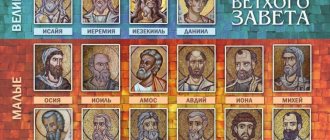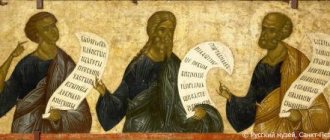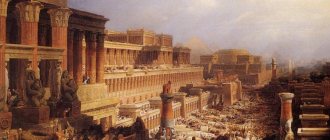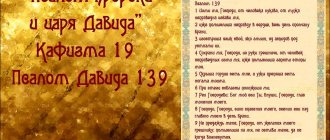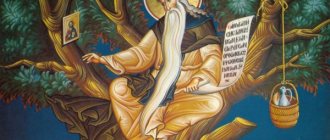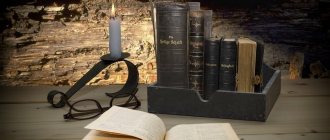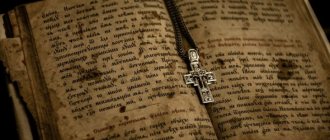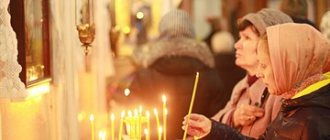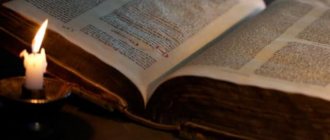Psalter (Psalter) is a book of the Old Testament, which consists of 150 or 151 psalm songs. In some languages the book is called Psalms . The Psalter is located among the teaching books of the Old Testament after the book of Job. The Psalter became a liturgical book even under David. Later, the liturgical use of the Psalter passed to Christians.
The importance of the book of Psalms is evidenced by the fact that it has come to us in the largest number of manuscripts among all the books of the Old Testament.
Read the Psalter / Psalter
The Psalter contains 150 psalms:
| 1-10 | 11-21 | 22-32 | 33-44 | 45-55 | 56-66 | 67-77 | 78-88 | 89-99 | 100-110 |
| 111-121 | 122-132 | 133-143 | 144-150 |
Numbering of psalms in the Psalter
The numbering of the psalms differs in Hebrew and Greek. The Orthodox Church uses Greek numbering. The Catholic Church uses both numbering options. In our description we will use the Greek version (150 Psalms).
Inscriptions in the Psalms.
Many psalms have inscriptions - additional information about the authors, performers of the psalms, and the events to which the psalms are dedicated are indicated. Translating the inscriptions has proven to be particularly difficult, so there are many options for translating them. Translators can only guess about the meaning of some words.
The inscriptions of psalms often indicate the order in which they should be sung. The musical instrument and motive to which the psalm must be sung have been determined.
Prophecy
God chose Davud as his prophet, sending down to him the Zabur or Psalter, the Holy Book. It confirmed that Taurat and everything that was revealed in it is the truth. Zabur called on people to follow the commandments of God given in Tavrat.
Prophet Davud did not fulfill the same mission on earth as Musa - Davud did not bring a new Sharia to this world. He sang poetic psalms from Zabur in his beautiful voice. No one on earth possessed such qualities as those endowed by the Almighty Daud. The voice with which the Almighty endowed the prophet David was so beautiful that no one had anything like it since the very moment of the creation of the world. When David sang psalms from the Holy Book of Zabur (Psalms), birds flocked to listen to them, singing along with him in their beautiful voices, and even genies gathered to hear David’s songs and praises. The Psalter was written in the Ibran language and consisted of one hundred and fifty suras with the covenants of God. The Zabur was revealed in the month of Ramadan and was full of good instructions, lessons and advice. It also contained predictions. They said that the prophet Dawood could sing seventy melodies, none of which repeated the others, and to these melodies he would recite the Zabur. Allah gifted David with a voice that had healing power - sick people, hearing it, were healed, and those who suffered from fever could recover. The amazing voice of the prophet David could revive people who had lost consciousness.
His name and the description of his beautiful voice have become household terms - and in modern days, if someone wants to express his admiration for someone’s beautiful voice, he tries to compare his beauty with the voice of the prophet David. It was said that the very nature of Tasbihom supported David singing psalms. And even Iblis began to envy him, and out of envy, in order to drown out the beautiful voice of David, Iblis invented string, wind and percussion musical instruments.
Being a faithful servant of God, the prophet David spent a lot of time praying to Allah and regularly fasted. The Almighty endowed him with truly miraculous abilities: he knew how to perform miracles, command stones, birds and wild animals, even mountains obeyed him.
The prophet David had a custom: without revealing his identity, he asked people about himself, trying to find out what shortcomings people thought he had, and then tried to correct these shortcomings in himself.
Daoud's Craft
Once the prophet David met with the archangel Gabriel, who appeared before him in the form of a stranger. According to his custom, the prophet Daoud asked the archangel Gabriel about himself, to which the archangel replied that if David had not eaten from the public treasury, he would have been a very good person. David realized his shortcoming and asked the Almighty that Allah would give him the ability to do some kind of craft, with the help of which he could earn his living. And then Allah Almighty gifted him with the ability to forge, and iron obeyed him, which he could knead with his hands like dough, and for this he did not need a hammer, anvil, fire, or furs, he could sculpt objects of any shape. From this iron, the prophet Daud could make chain mail, and he made a lot of them, sold them and in this way earned his bread, although David was one of the most powerful kings in history. Prophet Muhammad ﷺ said that Daoud ate only what he earned with his own hands.
Chain of the Prophet
To judge disputes that arise between people and make a fair decision according to the covenants of God, the prophet David used the miraculous chain with which he was gifted. This chain consisted of gilded red rings and was as strong as if it were made of iron. This chain could ring and inform the prophet David with its ringing about what was happening in Heaven. This wonderful chain hung in his mihrab, and he used it when he needed to find out who was right and who was wrong in a dispute. He held out the chain to those arguing and invited them to touch it. A guilty person's hand could not even reach the chain, but an innocent person could easily reach the chain. Prophet Dawud looked at this and determined who was wrong and who was right, and based on this result he made a decision in the dispute. The chain was never wrong, but over time people found a way to circumvent the chain's ability to determine the truth through cunning and cunning. The following case is cited as proof of this.
One man owned a precious stone, and he gave this stone for safekeeping to another and after a while demanded that he return the stone to him. But the one who had the stone in storage declared that he had already given the stone back, and this became the cause of a dispute, which they went to the prophet David to resolve. They asked David to resolve their dispute and determine with the help of a chain which of them was right, but the guilty one knew that he would not be able to reach the chain, and then he came up with this trick: he made a depression in his cane, into which he placed that very precious stone, and when it was his turn to reach for the chain, he gave this cane to the owner of the stone to hold. Before touching the chain, the cunning man turned to the Almighty with a prayer to confirm that he had returned the jewel, and then the chain dropped, and the dishonest man was able to touch it. After that, he took his staff from the owner of the stone. The owner of the stone was dumbfounded at how they managed to deceive him. But the next morning it turned out that the chain ascended to heaven again and never returned to earth after it was touched by the hand of a treacherous swindler. This story was narrated by Wahb ibn Munabbih.
And from then on, the prophet David made decisions in disputes in a completely different way: he invited people to take an oath or bring with them witnesses that they were right.
Slander of David
In the Old Testament and Jewish traditions, as well as in unreliable hadiths that are based on Jewishism, there are many groundless inclusions containing slander against God's prophets and messengers. One of these inclusions concerns the prophet Daoud:
The story of how David failed is told and the reason why it happened is commented upon in various ways. It happened like this. Prophet Daoud turned to the Almighty with a request to send down on him the same tests as the Almighty sent to such prophets as Ibrahim, Isaac, and Yakuba, so that through these trials the Prophet David could rise even more. The Almighty heard his prayer, and soon announced what day He was appointing for this, and ordered David to prepare for this day.
On the appointed day, Daoud was performing a divine service in his mihrab, when a small bird suddenly flew into the window and began to flutter and circle above his head. He decided that this bird had flown from Paradise itself, he tried to catch it, but the bird did not allow David to touch it. , she flew away through the same window and sat on a branch outside the window. It turned out that it was not a bird of paradise at all, but a cursed iblis, who in the form of a bird of paradise appeared to the prophet David in order to deceive him. King David was fascinated by the beauty of this bird, he followed it with his gaze and then his gaze stopped at a woman sitting on the shore of the lake - this woman was simply stunningly beautiful. Prophet David immediately fell in love with this woman. He became interested in her, but later found out that she was a married woman, and her husband named Avria was at that moment in gazavat (war). The Prophet David sent a letter to the commander of the army in which Avriyah served, and ordered that the commander send Avriyah to the front line of the battle, where he could be killed. The commander carried out his order as soon as he received the letter. In the first battle, the army in which Avria fought won, but in the next battle Avria was killed. When the period of Iddah expired, Daoud married a beautiful woman with whom he was in love, and by that time he already had ninety-nine wives - this woman gave him a son, the prophet Suleiman.
There is another version of this unreliable and false story - the woman was married to Avria, and David asked Avria to divorce her, since this was allowed according to the Sharia of that time. King David did not violate Sharia with this act, but he caused Avria suffering, and for a person who is close to Allah, this is not a good deed.
The end of this story is the same in all versions - Sabig became David’s wife, and this was his hundredth wife, and Avria had only one wife, and in the end he was left completely without a wife, and he endured separation from his beloved very painfully. Christians comment on this event as the fact that the Almighty doomed David to eternal repentance for this act in order to magnify his piety even more. Although this story is widely known, scholars do not accept its truth, as stated above, because the story describes behavior that is completely unworthy of even an ordinary person, let alone a prophet of God.
Authorship
In the inscriptions of psalms there are often proper names, but it is not always clear whose names these are - the author, the performer, or the person to whom the psalm is dedicated. The author of the Psalter is generally considered to be King David, although absolutely all researchers are confident that the Psalter is the fruit of the work of more than 10 authors. Moreover, the book was created over a long time - perhaps even more than a dozen generations. The time of creation of the psalms is from the time of Moses until the return from Babylonian captivity.
In the inscriptions of the Psalter the following names are indicated as authors:
- David,
- Asaph - chief psalmist under David,
- The sons of Korach are the temple gatekeepers,
- Adam,
- Abraham,
- Yeman,
- Idifun
- Moses, etc.
The Psalter was created gradually as a product of collective creativity and was subjected to numerous editions during its creation.
Inscriptions of the Psalms
Most of the psalms contain inscriptions which present considerable difficulty in establishing their origin and meaning. These inscriptions indicate the names of the psalmists - the compilers and performers of the psalms; historical events about which this or that psalm was written; instructions for performers, etc. For many words the meaning is not precisely established, because of this there are different translation options. Some inscriptions differ between the Masoretic text and the Septuagint; some inscriptions were added in the Church Slavonic text, so in the 1st and 2nd psalms the headings “Psalm of David” appeared, which were transferred to the Russian text of the Bible.
Summary and structure of the Psalter
The Psalms of the Psalter are conventionally divided into 4 groups:
- Personal complaints.
The scheme of a psalm of this type: appeal to God -> description of the situation -> trust in God -> request -> offering praise to God.
- People's laments.
They have a structure similar to personal lamentations, but are a collective appeal to God.
- Psalms of praise to the Lord.
The outline of a psalm of this type: a promise to give praise to the Lord -> a description of the blessings sent down -> deliverance -> an offering of praise -> an instruction to people to trust in God
- Hymns.
Celebrating the greatness of God and His mercy.
In addition to the psalms that belong to these four groups, mention should also be made of the psalms of wisdom, songs of ascension, and royal psalms.
Songs of Ascension are psalms sung by pilgrims as they ascend Mount Zion.
Royal psalms are psalms that describe important events in the royal life, for example, the ascension to the throne.
Interpretation of the Psalms.
Many editions of the Psalter contain interpretations of the psalms. Of the ancient interpretations, the following interpretations are especially popular:
- John Chrysostom,
- Ambrose,
- Augustine,
- Theodoret of Cyrus,
- Euphemia Zigabena.
From new interpretations:
- Tolyuka,
- Ewald;
- Bishop Feofan,
- Archpriest Vishnyakov.
In no other Old Testament book is personal faith in God shown in as many ways as in the book of Psalms. The Book of Psalms is a collection of religious poetry. Many psalms of the Psalter are addressed to God and are a reflection of personal religious feelings. The Psalms reflect the joy of being able to communicate with God. Through a psalm a person can express reverence for God. The psalms also reflect folk wisdom.
Literary features of the Psalter.
The first two psalms set the tone for the entire book. They are excellent examples of Hebrew biblical poetry. The poetic power of the Psalter is based on the syntactic parallelism of the texts, when a thought is expressed through synonymy, or opposing points of view are expressed in parallel.
The genre variety is also great . According to the genre of psalms, the Psalms can be divided into:
- Glorifying God,
- Prayers (Psalms 6, 50),
- Complaints (Psalms 43, 101),
- Curses (Psalms 57, 108),
- Historical Psalms (105),
- Wedding song (44),
- Philosophical Psalms (8),
- Hymns (103), etc.
Despite the division of the book into psalms and their genre diversity, the Psalter is an integral work, the main idea of which is the ability of a person to turn to God and reveal to him the depths of his soul.
Many psalms were translated into verse. Almost every canon has its own poetic Psalter. Only Lutherans do not use the poetic Psalter in their services.
In Russian poetry, poetic translations and paraphrases of individual psalms were addressed:
- Lomonosov,
- Sumarokov,
- Derzhavin,
- Glinka and others.
Features of the language of the Psalter.
- Associativity,
- Imagery,
- Symbolism,
- Allegory,
- Emotionality.
Psalter in Judaism.
Psalms play an important role in Judaism. They are used as personal prayers and for synagogue services. Some psalms are read here daily (for example, Psalms 144 - 150). Psalms 112-117 are read on holidays. There are certain psalms corresponding to the day of the week.
| Day of the week | Psalm |
| Monday | 47 |
| Tuesday | 81 |
| Wednesday | 93 |
| Thursday | 80 |
| Friday | 92 |
| Saturday | 91 |
| Sunday | 23 |
Psalter in Orthodoxy
In the Orthodox Church, many psalms are read at services daily and are assigned to individual services. During Vespers, Psalms 103, 140, 141, 129, 116 and 33 are read. At the beginning of Matins, Psalms 3, 37, 62, 87, 102, 142 are read. Before the reading of the canon, Psalm 50 is read. The funeral service includes the 118th Psalm. It is read on the eve of parental Saturdays. Various psalms are used in Liturgy, prayer services and rituals.
The monks read the Psalter throughout the week. During Great Lent, the Psalter is read twice in monasteries that adhere to the rules. The Psalter is used for cell prayer.
Psalter for Catholics.
In the Catholic tradition, psalms are part of daily worship in their “pure” form, unlike the Orthodox Church, where stichera and troparia are used to a greater extent. Basically, a four-week cycle of reading the Psalter is practiced. The Psalter is also used in personal prayer at home. For example, during Lent seven psalms of repentance are read.
The Bible, presented for family reading. Psalms of King David
| And David and all the children of Israel played before the Lord on all sorts of musical instruments of cypress wood, and on harps, and on psalters, and on timbrels, and on sistres, and on cymbals. 2 Kings 6:5 |
If the Gospel is
good
news the word of God,
expressing the attitude of God towards man, then the book of psalms of King David is, primarily,
the word of man,
expressing his attitude towards God. These two books seem to unite heaven and earth. And there are no more sublime monuments of communication, merging in the word of the Creator with His creation.
There is no state of the human soul that is not reflected in the inspired psalms of the king and prophet David. In them is the rejoicing of the praise of the Most High; they also contain the humiliation of one’s nature, imperfect as a result of the fall; in them there is also a fiery impulse to rise above this humiliation, to cover it with Divine mercy; in them there is a cry of repentance, incomparable in its height and depth; in them is the strength in the awareness of one’s weakness and in severe suffering to stop at the limit of murderous despondency, without crossing it; they also contain a life-giving faith in bliss as the ultimate goal and purpose of the immortal existence of the soul. Finally, they contain the height of prophetic insight into the coming to earth of the Deliverer - the Messiah.
But to express the full depth of the content of the psalms is to try to embrace the immensity, like the human soul with all the inexhaustible variety of feelings and motives and the boundless desire for its Source.
Let at least a few sparks of the inexhaustible flame of the human soul flare up before us. Let their unearthly brilliance illuminate the depth of the prayer to God of God’s holy anointed and prophet David:
“Lord, our God! how majestic is Your name throughout the whole earth! Your glory extends above the heavens! From the mouths of babes and sucklings You have made praise for the sake of Your enemies, in order to silence the enemy and the avenger.
When I look at Your heavens - the work of Your fingers, at the moon and the stars that You have set, what is man that You remember him, and the son of man that You visit him?
You made him a little lower than the Angels: You crowned him with glory and honor; You have made him ruler over the works of Your hands; He put everything under his feet. Lord our God! How majestic is Your name throughout the whole earth!”
“The heavens proclaim the glory of God, and the firmament proclaims the work of His hands. Day imparts speech to day, and night reveals knowledge to night. There is no language and no dialect where their voice is not heard.
Their sound goes throughout the whole earth, and their words to the ends of the world. He made a dwelling for the sun in them, and it comes out like a bridegroom from his bridal chamber, rejoicing like a giant to run the race: from the edge of the heavens is his departure, and his procession to their edge, and nothing is hidden from his warmth.
The law of the Lord is perfect, strengthens the soul; The revelation of the Lord is true, making wise the simple. The commandments of the Lord are righteous and gladden the heart; The commandment of the Lord is bright, it enlightens the eyes.”
“Give unto the Lord, ye sons of God, give unto the Lord glory and honor, give unto the Lord glory unto his name; worship the Lord in His splendid sanctuary. The voice of the Lord is over the waters; The God of glory has thundered, the Lord is over many waters. The voice of the Lord is strong, the voice of the Lord is majestic.
The voice of the Lord breaks the cedars; The Lord breaks down the cedars of Lebanon. The voice of the Lord shakes the wilderness; The Lord is shaking the wilderness of Kadesh."
“Let all the earth fear the Lord; let all who live in the universe tremble before Him, for He spoke, and it was done; He commanded, and it appeared. The Lord looks down from heaven and sees all the sons of men; from the throne on which He sits, He looks down upon all who live on earth.
He created the hearts of all of them and looks into all their affairs. Behold, the eye of the Lord is upon those who fear Him and trust in His mercy. Our heart rejoices in Him, for we have trusted in His holy name. May Thy mercy, O Lord, be upon us, as we trust in Thee.”
“Your knowledge is marvelous to me—high, I cannot comprehend it! Where will I go from Your Spirit, and where will I flee from Your presence? If I ascend to heaven - You are there; If I go down to the underworld, you will be there too. If I take the wings of the dawn and move to the edge of the sea, Thy hand will lead me there, and Thy right hand will hold me.
Test me, O God, and know my heart; test me and know my thoughts; and see if I am on a dangerous path, and guide me on the eternal path.”
“Keep me, O God, for I trust in You. The Lord is part of my inheritance and my cup. You hold my lot. My lands have passed through beautiful places, and my heritage is pleasant to me.
I have always seen the Lord before me, for He is at my right hand; I will not hesitate. Therefore my heart rejoiced and my tongue was glad; even my flesh will rest in hope. You will show me the path of life: fullness of joy is before Your face, bliss is at Your right hand forever.”
“I will love You, O Lord, my strength! The Lord is my rock and my refuge, my Deliverer, my God is my rock; in Him I trust; my shield, the horn of my salvation and my refuge. I will call upon the venerable Lord and I will be saved from my enemies.
For who is God besides the Lord, and who is a defense besides our God? God girds me with strength and arranges for me the right path.”
“As a deer longs for streams of water, so longs my soul for You, O God! My soul thirsts for the mighty, living God: when will I come and appear before the face of God! My tears were bread for me day and night, when they said to me every day: Where is your God? Why are you depressed, my soul, and why are you embarrassed? Trust in God, for I will still praise Him, my Savior and my God.
I will say to God, my intercessor: why have you forgotten me? Why do I walk around complaining about the enemy’s insults? As if striking my bones, my enemies mock me when they say to me every day: Where is your God? Why are you depressed, my soul, and why are you embarrassed? Trust in God, for I will still praise Him, my Savior and my God.”
"God! Do not rebuke me in Your wrath, and do not punish me in Your anger, for Your arrows have pierced me, and Your hand is heavy on me. There is not a whole place in my flesh from Your wrath; there is no peace in my bones because of my sins, for my iniquities have gone beyond my head, like a heavy burden weighing me down.
I am faint and broken beyond measure; I scream from the torment of my heart. God! All my desires are before You, and my sighing is not hidden from You. My heart trembles; my strength has left me. I am close to falling, and my sorrow is always before me. I recognize my iniquity, I lament my sin. Do not leave me, Lord, my God! Don't move away from me; hasten to help me, O Lord, my Savior!”
“Have mercy on me, O God, according to Your great mercy, and according to the multitude of Your compassions blot out my iniquities. Wash me often from my iniquity, and cleanse me from my sin, for I am aware of my iniquities, and my sin is always before me. You, You alone, have I sinned and done evil in Your sight, so that You are righteous in Your judgment and pure in Your judgment. Behold, You have loved the truth in your heart and have shown me (Your) wisdom within me. Sprinkle me with hyssop, and I will be clean; Wash me, and I will be whiter than snow.
Let me hear joy and gladness, and the bones broken by You will rejoice. Turn Your face away from my sins and blot out all my iniquities. Create in me a clean heart, O God, and renew a right spirit within me. Do not cast me away from Your presence and do not take Your Holy Spirit from me. Restore to me the joy of Thy salvation and strengthen me with the sovereign Spirit.
God! Open my mouth, and my mouth will declare Your praise: for You do not desire sacrifice, I would give it; You do not favor burnt offerings. A sacrifice to God is a broken spirit; You will not despise a contrite and humble heart, O God.”
When King David felt the irresistible goodness of the whole world responding to this cry of suffering about his sinfulness, his heart was filled with grateful prayerful jubilation:
“I will exalt You, O Lord, that You have raised me up. Oh my God! I cried out to You and You healed me. God! You brought my soul out of hell and revived me so that I would not go to the grave. Sing to the Lord, ye His saints, glorify the memory of His holiness, for His wrath is for a moment, His favor is for a lifetime: mourning may endure for a night, but joy comes in the morning.
And You turned my lamentation into rejoicing, took off my sackcloth and girded me with joy, so that my soul glorify You and may not be silent. Oh my God! I will praise You forever."
“I trusted firmly in the Lord, and He bowed down to me and heard my cry; He brought me out of the terrible pit, out of the muddy swamp, and set my feet on a rock and established my steps; and he put a new song in my mouth - praise to our God. Many will see and fear and will trust in the Lord. Let all those who seek You rejoice and be glad in You, and let those who love Your salvation say without ceasing: Great is the Lord!”
“Praise the Lord, for He is good, for His mercy endures forever. Whoever speaks of the power of the Lord will proclaim all His praises?”
In his instructive psalms, King David touchingly describes the bliss of a righteous man, his family joys and the advantage of the law of the Lord.
“Blessed is the man who does not walk in the counsel of the wicked, nor stand in the way of sinners, nor sit in the seat of the wicked; but his will is in the law of the Lord, and on His law he meditates day and night! And he will be like a tree planted by streams of water, which brings forth its fruit in its season, and whose leaf does not wither; and in everything he does, he will succeed. Not so - the wicked, not so: but they are like dust swept away by the wind from the face of the earth.
Therefore the wicked will not stand in judgment, nor sinners in the assembly of the righteous. For the Lord knows the way of the righteous, but the way of the wicked will perish.”
“Blessed is everyone who fears the Lord and walks in His ways! You will eat from the labor of your hands: blessed are you, and good to you! Your wife is like a fruitful vine in your house; Your sons are like olive branches around your table: so will the man who fears the Lord be blessed!
The Lord will bless you from Zion, and you will see the prosperity of Jerusalem all the days of your life. You will see your sons' sons. Peace be upon Israel."
“How I love Your law! I think about it all day. By Your commandment You have made me wiser than my enemies, for it is always with me. I have become more intelligent than all my teachers, for I meditate on Your revelations. I am more knowledgeable than the elders, for I keep Your commandments. How sweet are Your words to my throat! better than honey to my lips.
Your word is a lamp to my feet and a light to my path. My soul is continually in my hand, but I do not forget Your law. I have accepted Your revelations as an inheritance forever, for they are the joy of my heart. The truth of Your revelations is eternal: give me understanding, and I will live.”
In Psalms 2, 21 and 109, King David is a prophet, since everything that God inspiredly revealed to him about the suffering and future glory of Jesus Christ, the Son of God, who was about to come into the world, about whom the Lord says:
“The kings of the earth rise up, and the princes take counsel together against the Lord and against His Anointed. I have anointed My King over Zion, My holy mountain; I will proclaim the decree: The Lord said to Me: You are My Son, today I have begotten You; ...and I will give the nations for Your inheritance, and the ends of the earth for Your possession.”
"My God! My God! Why have you forsaken me? (Words spoken by Jesus Christ on the Cross) Everyone who sees me mocks me, saying with their lips, nodding their heads: he trusted in the Lord; let him deliver him, let him save him, if he pleases him. A crowd of evil people surrounded me; They pierced my hands and my feet. One could count all my bones; and they look and make a spectacle out of me; They divide my garments among themselves and cast lots for my clothing.”
“The Lord said to my Lord, Sit at My right hand, until I make Your enemies Your footstool.”
And other psalms contain the deepest insights of the wondrous psalmist, for example, about the betrayal of Judas: “My sincere man, in whom I trusted, who ate my bread, has lifted up his heel against me”; and about the resurrection of Jesus Christ: “Arise, O God, judge the earth, for You will inherit all nations”; and about His ascension into heaven: “Be exalted above the heavens, O God, and let your glory be over all the earth!”
(Ps. 8, 18, 28, 32, 138, 15, 17, 41, 37, 50, 29, 39, 105, 1, 127, 118, 2, 21, 109, 40, 81, 56)
The Psalms of David also form part of Christian worship. They are collected in one sacred book called the Psalter,
which, after the Gospel, is the only book that has served and continues to serve as consolation, enlightenment and joyful reassurance for all times and for all peoples professing the Christian faith, and the God-loving souls of the Jewish people, who first received it.
